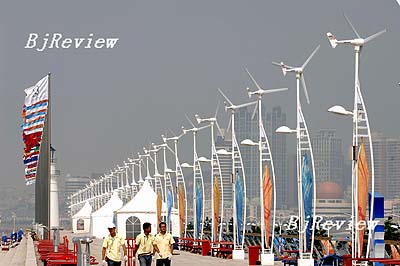|

The Beijing Organizing Committee for the Games of the XXIX Olympiad (BOCOG) said in a statement that it had decided to temporarily halt all domestic ticket sales to improve technical plans and will announce new ticketing information on November 5.
"Because of the overwhelming volume of page visits, the technical system was unable to perform its tasks well enough, and many applicants were unable to successfully submit their applications," said a BOCOG statement.
"We sincerely apologize to the public," it added.
The first-come-first-served ticket sale scheme, which was expected to last until late January 2008, had put 1.85 million tickets on sale through three channels: the Beijing Olympic Official Ticketing website, 1,000 BOCOG-designated Bank of China branches, and the Beijing Olympic Ticketing Call Center, 8610 952008.
Rong Jun, Director of the Ticketing Department of BOCOG, said at a pre-sale press conference that in order to make sure that the Beijing Olympic Official Ticketing website could handle the huge influx of applications and visits, the system had been successfully tested to handle the sale of 30,000 tickets and 1 million visits per hour.
But demand was much higher than organizers anticipated. According to the Beijing Olympic Ticketing Center, the official ticketing website (www.tickets.beijing2008.cn) saw 8 million hits in the first hour starting at 9 a.m. and the ticketing hotline received 3.8 million calls in the first hour.
Only around 9,000 tickets were sold in the first two hours through the three channels. The ticketing center confirmed that successful orders will still be valid.
A total of 7 million tickets are available for the Games with about 75 percent reserved for domestic sales. The first 1.6 million tickets were allocated after a lottery earlier this year. The third phase-from April to August next year-will also sell tickets on a first-come-first-served basis.
Qingdao in the green
Cost-efficient and environment-friendly Olympic sailing facilities in Qingdao, host city of Olympic sailing competitions, will continue to be a tourist attraction to showcase the coastal city's new energy-saving technologies after next year's events.
"The principles of cutting costs and protecting the environment have been faithfully implemented throughout the construction process," said Wang Yong, an official of the Sailing Committee (Qingdao) of BOCOG.
The logistics center for the sailing venues and the Olympic village have installed a solar-powered air-conditioning/heating system, which can provide cooling in summer, heating in winter and hot water throughout the year. This system, using absorbents and refrigeration, causes no damage to the ozone layer and saves around 474,000 kw of electricity every year.
The Olympic village in Qingdao has installed 168 solar street lamps and 41 wind powered street lamps, which can altogether save 23,570 kw of electricity a year.
Smooth sailing, weather wise
The first buoy station built to monitor the hydro-meteorological parameters for Qingdao's Olympic competition waters has been completed in order to meet the needs of the sailing events.
Following a tour of the station, inspectors from the Atmospheric Observation Technology Center, a subordinate body of the China Meteorological Administration, reached a consensus that the station meets the specific technical requirements set forth in an earlier contract. Equipment performance, power supply, communications and other facilities are all up to standard, and the system operates well and is highly reliable.
The station was launched on July 31, 2007, and has already played an important role in weather forecasting for the city and weather services for the Olympic test sailing events.
Games hold water
Water conservation policies have become prevalent aspects of Olympic venues, which make use of one, or a combination of these technologies: reclaimed water, recycled rainwater, and sewage treatment stations.
If it rains during a competition at the National Stadium-nicknamed "The Bird's Nest"-a drain and hidden steel gutter system at the top of the structure will create a siphoning effect to completely remove rainwater. In addition, the gutters can be heated to melt snow that collects in the drains in the winter and effectively clear the melted snow.
Rainwater collected at the National Stadium will be treated and combined with the city's reclaimed water supply for irrigation and other purposes.
At the National Aquatics Center-nicknamed "The Water Cube"-an estimated 10,500 cubic meters of water will be collected and treated for reuse.
The turf at the National Indoor Stadium will facilitate the absorption of rainwater into the ground. In addition, rainwater collected on the rooftop will be treated and used for irrigation and sewer flushing.
| 